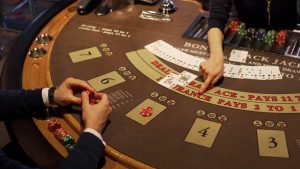
Online gambling has become a ubiquitous presence in the digital age. The allure of virtual casinos, sports betting platforms, and online poker rooms has captivated millions of individuals worldwide. But what exactly makes เว็บพนันออนไลน์ เว็บตรงไม่ผ่านเอเย่นต์ online gambling so addictive? The intricate psychology behind the allure of online gambling and what drives individuals to keep coming back for more.
The Thrill of Uncertainty
One of the primary factors that make เว็บพนันบอล ไม่ผ่านเอเย่นต์ online gambling addictive is the thrill of uncertainty. The anticipation of a win or loss keeps players engaged, releasing adrenaline, and creating a sense of excitement.
Dopamine Rush: The Brain’s Reward System
Online gambling triggers the brain’s reward system by releasing dopamine, a neurotransmitter associated with pleasure and reward. Winning a bet or hitting the jackpot floods the brain with dopamine, creating a euphoric feeling that players seek to replicate.
Accessibility and Convenience
The ease of access to online gambling platforms is another contributing factor. With the internet at our fingertips, players can indulge in their favorite games anytime, anywhere, making it difficult to resist the temptation.
Social Interaction and Belonging
Many online gambling platforms offer social features, fostering a sense of belonging and community among players. Interacting with others, sharing experiences, and competing with friends amplify the appeal of online gambling.
Personalization and Engagement
Online casinos employ sophisticated algorithms to personalize gaming experiences. Tailored bonuses, rewards, and suggestions keep players engaged and enticed to continue gambling.
Escapism and Stress Relief
For some, online gambling provides a temporary escape from the stresses of daily life. It offers a way to unwind and forget about problems momentarily, creating a psychological dependency.
Loss Aversion and the Sunk Cost Fallacy
The fear of losing money is a powerful motivator. Players often fall into the trap of the sunk cost fallacy, believing that the more they invest, the closer they are to winning, leading to increased gambling.










